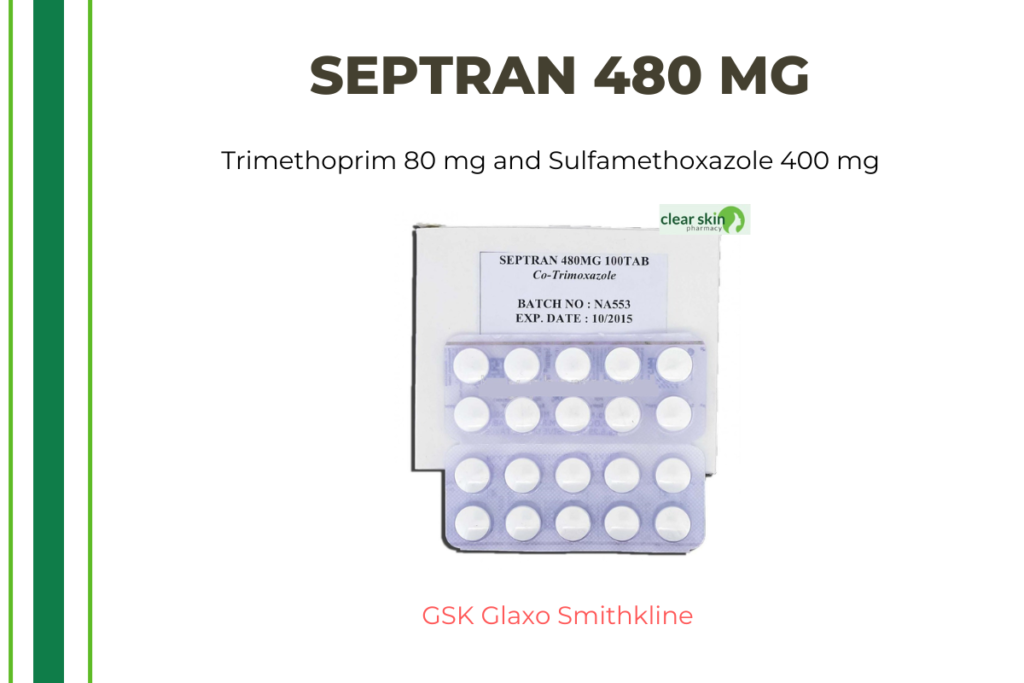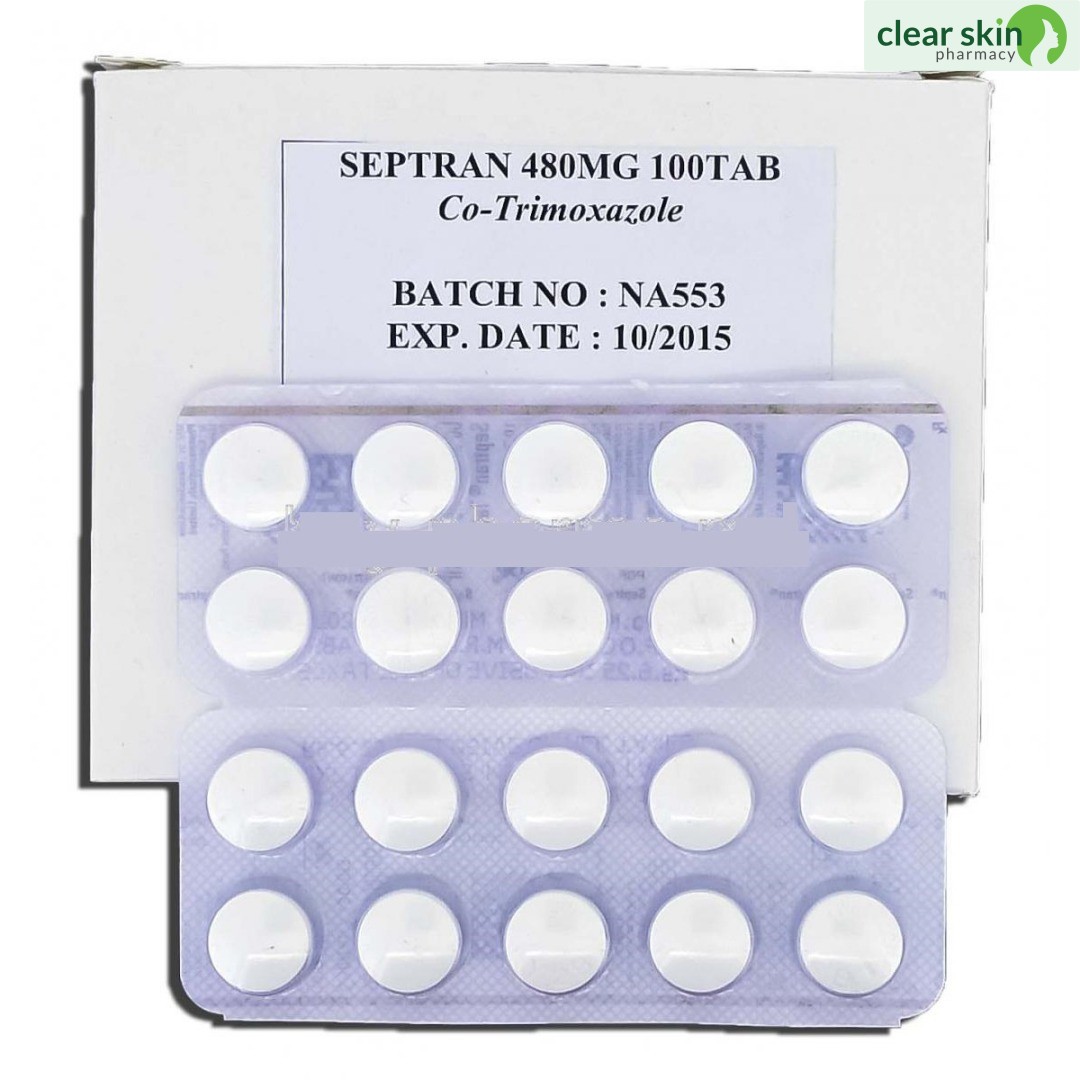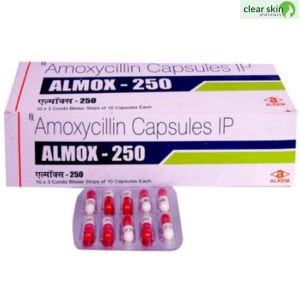Septran 480 MG
Septran 480 MG is an antibiotic used to treat urinary tract, respiratory tract (bronchitis), ear (otitis media), lungs (pneumonia), skin, and brain bacterial infections, as well as toxoplasmosis (infection caused by a bacteria called toxoplasma). Bacterial infections are caused by the multiplication of harmful microorganisms within or on the body. Bacteria that are either contagious or toxic can rapidly proliferate and cause illness. These dangerous bacteria create toxins, which can cause tissue damage and illness. Septran 480 MG is ineffective against viral illnesses like the common cold and influenza.
Septran 480 MG contains Trimethoprim (folic acid inhibitors) and Sulfamethoxazole, two antibiotics (sulfonamides). Trimethoprim inhibits the production of tetrahydrofolic acid by bacteria, while sulfamethoxazole inhibits the production of dihydrofolic acid. Tetrahydrofolic acid and dihydrofolic acid are necessary for the synthesis of proteins and nucleic acid, both of which are essential for bacterial life. By inhibiting these enzymes, Septran 480 mg eliminates germs and stops their growth. Consequently, ai480 mg is used to treat bacterial infections.
To prevent nausea and diarrhea, use Septran 480 mg with meals or a glass of water. In contrast, Septran 480 mg can be taken with or without food. Septran 480 mg pills should be swallowed whole without crushing or chewing. Septran 480 MG liquid should be administered orally using the measuring cup provided; shake the bottle well before each use. Depending on the nature and severity of your ailment, the dosage and duration of Septran 480 MG may vary. Because it’s an antibiotic, it’s also advisable to complete the entire course of therapy, even if you feel better. Skipping it could result in a more serious infection that doesn’t respond to the antibiotic (antibiotic resistance). High potassium levels in the blood, palpitations (irregular heartbeats), thrush or candidiasis (fungal infection), headache, nausea, diarrhea, and skin rashes are some of the most common side effects. The majority of these side effects do not require medical intervention and will subside with time. However, if you have these side effects frequently, you should visit your physician.
Inform your doctor if you have an allergy to any antibiotic or if you have renal or liver problems before using Septran 480 MG. Self-medication with Septran 480 MG can lead to antibiotic resistance, which occurs when specific bacterial illnesses no longer respond to antibiotic treatment. Before using Septran 480 MG if you are pregnant or nursing, see your physician. Avoid ingesting alcohol to avoid unpleasant side effects such as rapid heartbeats, skin redness or warmth, tingling sensations, nausea, and vomiting. Children younger than 12 years old should not receive Septran 480 mg. Inform your doctor of all the medications you’re taking and your current state of health in order to rule out any adverse effects.
Infections caused by bacteria are treated with Septran 480 mg.

Medicinal Advantages
Septran 480 MG is an antibiotic used to treat urinary tract, respiratory tract (bronchitis), ear (otitis media), lungs (pneumonia), skin, and brain bacterial infections, as well as toxoplasmosis (infection caused by a bacteria called toxoplasma). Septran 480 MG contains Trimethoprim (folic acid inhibitors) and Sulfamethoxazole, two antibiotics (sulfonamides). Trimethoprim inhibits the production of tetrahydrofolic acid by bacteria, while sulfamethoxazole inhibits the production of dihydrofolic acid. Tetrahydrofolic acid and dihydrofolic acid are necessary for the synthesis of proteins and nucleic acid, both of which are essential for bacterial life. By inhibiting these enzymes, Septran 480 mg eliminates germs and stops their growth. Consequently, ai480 mg is used to treat bacterial infections. Septran 480 MG is an antibiotic with a broad spectrum that kills gram-positive and gram-negative bacteria, including Streptococcus pneumoniae, E. coli, Klebsiella species, Enterobacter species, and Haemophilus influenzae, among others.
Use Instructions
To prevent nausea and diarrhea, use Septran 480 mg with meals or a glass of water. In contrast, Septran 480 mg can be taken with or without food. Septran 480 mg pills should be swallowed whole without crushing or chewing. Septran 480 MG liquid should be administered orally using the measuring cup provided; shake the bottle well before each use. Depending on the nature and severity of your ailment, the dosage and duration of Septran 480 MG may vary.
Place in a cool, dry area out of direct sunlight.
Septran 480 MG Side Effects
Septran 480 mg, like all medications, can cause side effects, although not everyone experiences them. High potassium levels in the blood, palpitations (abnormal heartbeats), thrush or candidiasis (fungal infection), headache, nausea, diarrhea, and skin rashes are the most common adverse effects of Septran 480 MG. If you experience any of these side effects frequently, please consult a physician.
Drug Recommendations
You should not take Trimethoprim (folic acid inhibitors) and Sulfamethoxazole (sulfonamides) if you have severe liver or renal problems, thrombocytopenia (low platelet counts in the blood), or porphyria (rare blood problem that affects skin or nervous system). Self-medication with Trimethoprim (folic acid inhibitors) and Sulamethoxazole (sulfonamides) can lead to antibiotic resistance, which occurs when certain bacterial diseases are no longer treatable. Consult a physician immediately if you develop a rash or experience persistent, severe diarrhea accompanied by abdominal pain. Consult your physician before taking Trimethoprim (folic acid inhibitors) and Sulfamethoxazole if you have severe allergies, asthma, ulcers, blood disorders, thyroid dysfunction, diabetes, are elderly, underweight, or malnourished; if you have folic acid deficiency, glucose-6-phosphate dehydrogenase deficiency, or high potassium levels in the blood (sulfonamides). If you are pregnant or breastfeeding, do not use Trimethoprim (folic acid inhibitors) or Sulfamethoxazole (sulfonamides) unless instructed by your physician. Avoid consuming alcohol when taking Trimethoprim (folic acid inhibitors) and Sulfamethoxazole in order to prevent unpleasant side effects such as rapid heartbeats, skin redness or warmth, tingling, nausea, and vomiting (sulfonamides).
Interactions Between Drugs
Sulphonylureas (gliclazide, glibenclamide), thiazide diuretics (bendroflumethiazide), antibiotics (azithromycin, metronidazole), and bronchodilators (azithromycin, metronidazole) might interact with trimethoprim and Sulfamethoxazole (albuterol).
Avoid consuming alcohol when taking Trimethoprim (folic acid inhibitors) or Sulfamethoxazole (sulfonamides) in order to avoid unpleasant side effects such as rapid heartbeats, skin redness or warmth, tingling sensations, nausea, and vomiting.
Trimethoprim (folic acid inhibitors) and Sulfamethoxazole (sulfonamides) may interact with colitis, hematologic toxicity, hypersensitivity reactions, porphyria (rare blood disorder affecting the skin or nervous system), folate deficiency, crystalluria (cloudy urine), dialysis, urinary obstruction, kidney, and liver dysfunction.
Safety Suggestions
ALCOHOL
Avoid consuming alcohol when taking Trimethoprim (folic acid inhibitors) and Sulfamethoxazole in order to prevent unpleasant side effects such as rapid heartbeats, skin redness or warmth, tingling, nausea, and vomiting (sulfonamides).
PREGNANCY
Because they can cause birth defects, pregnant women should not take Trimethoprim (folic acid inhibitors) or Sulfamethoxazole (sulfonamides) unless instructed to do so by a physician. Consult your physician before taking Trimethoprim (folic acid inhibitors) or Sulfamethoxazole if you are pregnant (sulfonamides). Trimethoprim and Sulfamethoxazole will only be prescribed if the benefits outweigh the hazar480 mg.
BREAST FEEDING
Breast milk may include Sulfamethoxazole (sulfonamides) and Trimethoprim (folic acid inhibitors). Consult your physician if you are breastfeeding; Trimethoprim (folic acid inhibitors) and Sulfamethoxazole (sulfonamides) will only be recommended if the benefits outweigh the hazar480 mg.
DRIVING
It has not been demonstrated that Trimethoprim (folic acid inhibitors) and Sulamethoxazole (sulfonamides) impair your ability to drive or operate machinery. You should only drive or operate machinery or vehicles if you are physically and psychologically fit; Trimethoprim (folic acid inhibitors) and Sulfamethoxazole may cause dizziness or fatigue (sulfonamides).
LIVER
Consult your doctor before taking Trimethoprim (folic acid inhibitors) or Sulfamethoxazole if you have liver damage or disease (sulfonamides). Before recommending it to you, your doctor will weigh the benefits and any potential hazar480 mg side effects.
KIDNEY
Sulfamethoxazole (sulfonamides) and Trimethoprim (folic acid inhibitors) should be used with caution, particularly if there is a history of renal disease or impairment. Your physician may need to adjust the dosage.
No habit formation
Advice on Diet and Lifestyle
Antibiotics have the ability to affect the digestively helpful bacteria in the stomach. Therefore, probiotic-rich foods such as yoghurt/curd, kefir, sauerkraut, tempeh, kimchi, miso, kombucha, buttermilk, natto, and cheese are advised.
High-fiber foods include whole grains, beans, lentils, berries, broccoli, peas, and bananas.
Calcium-rich foods, grapefruit, and grapefruit juice should be avoided, as they may inhibit the absorption of antibiotics.
To effectively treat your ailment, abstain from alcohol consumption.
Nicotine should be avoided.
Complete the full course of Trimethoprim (folic acid inhibitors) and Sulamethoxazole (sulfonamides) to effectively treat your condition, even if you have symptomatic relief.
Recommendations
Some laboratory tests, such as blood tests, may be affected by Sulfamethoxazole (sulfonamides) and Trimethoprim (folic acid inhibitors). Inform the individual doing the tests that you are taking Trimethoprim (folic acid inhibitors) and Sulfisoxazole (sulfonamides).
If you have kidney problems or have been using Trimethoprim (folic acid inhibitors) and Sulfamethoxazole (sulfonamides) for an extended period of time, your doctor may recommend that you undergo routine testing to ensure that the medication is functioning effectively.
Additional Information: This item is non-refundable.
Concerns of Patients
Bacterial infections are produced by pathogenic bacteria that invade, proliferate, and infect human bodies. Bacteria that are either contagious or toxic can rapidly proliferate and cause illness. These dangerous bacteria create toxins, which can cause tissue damage and illness. It can attack any part of the body and reproduces rapidly. When infected by germs, you may have nonspecific symptoms such as fever, chills, and fatigue. The most frequent bacterial morphologies are spherical, rod-like, and spiral-shaped. From sore throats and ear infections to meningitis and encephalitis, bacterial illnesses range from mild to severe. A bacterial infection is capable of affecting anyone, at any moment. In contrast, persons with compromised immune systems or those taking immunosuppressive drugs are more susceptible to bacterial infection.
FAQs
The two antibiotics in Trimethoprim 80 mg and Sulfamethoxazole 400 mg are Trimethoprim (folic acid inhibitors) and Sulfamethoxazole (sulfonamides). Trimethoprim inhibits the production of tetrahydrofolic acid by bacteria, while sulfamethoxazole inhibits the production of dihydrofolic acid. Tetrahydrofolic acid and dihydrofolic acid are necessary for the synthesis of proteins and nucleic acid, both of which are essential for bacterial life. By inhibiting these enzymes, Trimethoprim (folic acid inhibitors) and Sulamethoxazole (sulfonamides) kill bacteria and stop their development. Consequently, ai480 mg is used to treat bacterial infections.
Candida overgrowth in the mouth or throat causes thrush or candidiasis, a fungal infection. Trimethoprim (folic acid inhibitors) and Sulfamethoxazole (sulfonamides) induce candidiasis or thrush. Regularly rinse your mouth with water to keep fungus at bay.
As a side effect, Trimethoprim (folic acid inhibitors) and Sulfamethoxazole (sulfonamides) may cause diarrhea. If you have diarrhea, consume copious amounts of water and fiber-rich foods. Stop taking Trimethoprim (folic acid inhibitors) and Sulfamethoxazole (sulfonamides) and see your doctor if you detect blood in your stools (tarry stools) or if you have prolonged diarrhea accompanied by abdominal pain. Do not provide anti-diarrheal medication to yourself.
Even if you are feeling better, it is recommended that you complete the entire course of Trimethoprim (folic acid inhibitors) and Sulfamethoxazole (sulfonamides) because it is an antibiotic and missing doses may result in recurrent infections. Trimethoprim (folic acid inhibitors) and Sulfamethoxazole (sulfonamides) should be used for as long as recommended by your doctor in order to effectively treat your sickness.
Avoid consuming alcohol when taking Trimethoprim (folic acid inhibitors) and Sulfamethoxazole in order to prevent unpleasant side effects such as rapid heartbeats, skin redness or warmth, tingling, nausea, and vomiting (sulfonamides).
Self-medication with Trimethoprim (folic acid inhibitors) and Sulamethoxazole (sulfonamides) can lead to antibiotic resistance, which occurs when certain bacterial diseases are no longer treatable.
Trimethoprim (folic acid inhibitors) and sulfamethoxazole may influence the findings of some laboratory tests (sulfonamides). Inform the individual doing the tests that you are taking Trimethoprim (folic acid inhibitors) and Sulfisoxazole (sulfonamides).
Sulfamethoxazole (sulfonamides) and Trimethoprim (folic acid inhibitors) might increase blood potassium levels, which may lead to irregular heartbeats (palpitations). Potassium levels and heart rate should be monitored frequently in patients receiving Trimethoprim (folic acid inhibitors) and Sulfamethoxazole (sulfonamides).








Be the first to review “SEPTRAN 480 MG 10 Tablets”